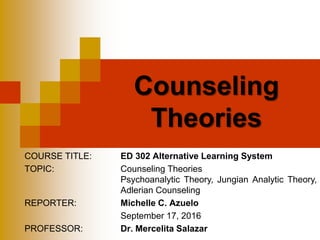
Counseling Theories
- 1. COURSE TITLE: ED 302 Alternative Learning System TOPIC: Counseling Theories Psychoanalytic Theory, Jungian Analytic Theory, Adlerian Counseling REPORTER: Michelle C. Azuelo September 17, 2016 PROFESSOR: Dr. Mercelita Salazar Counseling Theories
- 2. COUNSELING THEORIES 1. Psychoanalytic Theory 2. Jungian Analytic Theory 3. Adlerian Counseling
- 3. SIGMUND FREUD Is said to be the founder and father of psychoanalytic theory. He was an Austrian neurologist and psychiatrist who co-founded the psychoanalytic school of psychology. A person’s thoughts and behaviors emerge from tension generated by unconscious motives and unresolved childhood conflicts.
- 4. PSYCHOANALYTIC THEORY It is a method of investigating and treating personality disorders and is used in psychotherapy. Things that happen to people during childhood can contribute to the way they later function as adults. The conscious mind and the unconscious mind
- 5. TENETS OF PSYCHOANALYTIC THEORY The three parts of the personality (Id, Ego and Superego) Stages of Development (Oral, anal, phallic, latency period and genital) Defense mechanisms (Repression, projection, reaction formation, fixation, regression)
- 6. EXAMPLES 1. Every time the vehicle she is riding in stops suddenly, Mrs. Smith panics. She thinks this is because she was in a car accident when she was a child, and in each new situation the fear of another accident crashes over her like a wave. 2. Jack’s mother left his family when he was a child. Ever since then, he has had a very difficult time trusting people because he is afraid they will abandon him.
- 7. EXAMPLES 3. The violent behavior of criminals is often traced to the violent ways they themselves were treated during their formative years. 4. Amber is 57 years old and is an accomplished professional, but she never feels like her work is good enough and is always afraid that people will be unhappy with her performance. She realizes that she might have this outlook because when she was growing up, her mother criticized everything she did.
- 8. EXAMPLES 5. When Melanie graduated from college, she almost couldn’t believe it. She never thought she’d do it because the words of her first grade teacher calling her a failure had always haunted her. 6. Cheryl had grown up in an abusive home, and couldn’t wait to get to college to escape from her parents. She met some wonderful people at school, but it took her a long time to develop close friendships because of the trust issues she had developed as a child and teenager.
- 9. EXAMPLES 7. Sarah was adopted into a loving family when she was five. However, for years she displayed aggressive behavior towards her adoptive parents and siblings, even though they were incredibly kind to her. The adoption specialists advised the family not to take Sarah’s behavior personally, explaining that her anger was really directed at her birth parents and former foster families for the way she had been treated.
- 10. CARL JUNG Jung was born in 1875 His early life was influential in forming his perceptions of the psyche and the human condition. Early methods are now commonplace including his face-to-face way of working with clients (as opposed to the patient lying on a couch while the analyst sits behind).
- 11. JUNGIAN ANALYTIC THEORY Facilitating growth, healing and a new synthesis of the patient’s personality at a higher level of functioning. The overall goal bringing about a wholeness of the personality through “individuation”.
- 12. ADLERIAN COUNSELING Adlerian theory and practice have proven especially productive as applied to the growth and development of children. Adlerian believe that "a misbehaving child is a discouraged child" and that helping children to feel valued, significant, and competent is often the most effective strategy in coping with difficult child behaviors.
- 13. ADLERIAN COUNSELING Self-perceived inferiority Position in the family constellation Early experiences of humiliation Specific physical condition or defect existed; Lack of social feeling for others was present.
- 14. TENETS OF ADLERIAN COUNSELING 1. The one dynamic force behind people’s behavior is the striving for success or superiority. 2. People subjective perceptions shape their behavior and personality. 3. Personality is unified and self-consistent. 4. The value of all human activity must be seen from the viewpoint of social interest. 5. The self-consistent personality structure develops into a person’s style of life. 6. The style of life is molded by people’s creative power.
- 15. ALFRED ADLER See the power of self- determination Command the courage to alter their interpretation in events and life experience. Importance of human culture and society in the development of individual personality.
- 16. ALFRED ADLER Social interest urge in human nature to adapt oneself to the conditions of the social environment. Finalism – individuals are oriented towards goals that guide their behavior, many of which cannot be proven and are judged by their usefulness.
- 17. ALFRED ADLER Crucial and contemporary issues as equality, parent education, and the influence of birth order, life style, and the holism of individuals. Adler believed that we all have one basic desire and goal: to belong and to feel significant.
- 18. ALFRED ADLER According to Adler, when we feel encouraged, we feel capable and appreciated and will generally act in a connected and cooperative way. When we are discouraged, we may act in unhealthy ways by competing, withdrawing, or giving up. Expressing and accepting encouragement, respect, and social interest that help us feel fulfilled and optimistic.
- 19. Words to Ponder